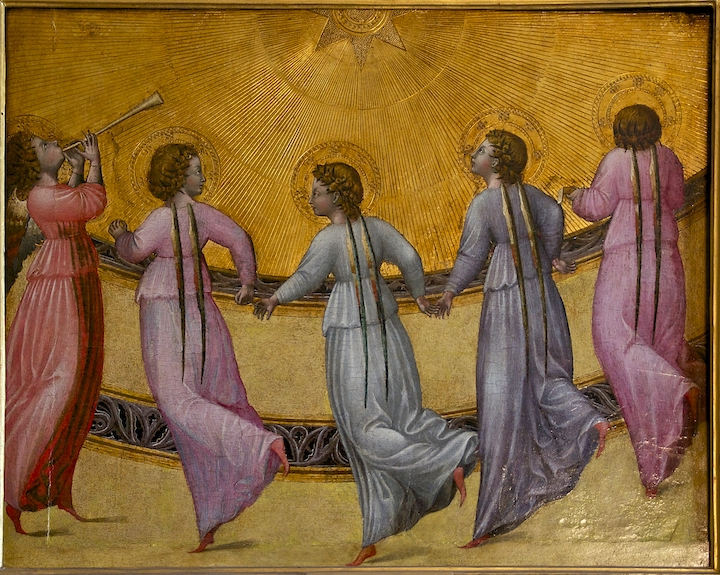
Published December 16, 2021
On Gaudete Sunday (the third Sunday of Advent), the Church reminds us – commands us, really – to rejoice. In the words of St. Paul, we heard proclaimed Sunday: “Rejoice in the Lord always. I shall say it again: rejoice!” This reminder comes amid all the preparations for the coming feast of Christmas, even as the world around us darkens and winter deepens to the dead of the year.
I confess I generally find Advent an easy season for rejoicing. For me, Gaudete Sunday comes less as a reminder than a release: quasi-official permission to abandon whatever vestiges of guilt I might feel for having already decorated the tree and strung the lights. And yes, I’ll have another Christmas cookie, thank you!
All the stuff we put to use in our celebrations and rejoicing – the candles and wreaths and carols and gifts and food – points to the source of our joy. And in this regard, no season is more sacramental than Advent. But if our rejoicing is aided by surrounding ourselves with things that direct us to the deeper meaning of Christmas, then that deepest meaning also reveals something to us about all our stuff, and about ourselves.
The source of our joy, of course, is the coming birth of our Savior. We rejoice because the one who comes to save us is on His way. He will be here very soon! We rejoice at the good news of our salvation. We rejoice that the God who made us, who sent us out from Eden after our Fall, has pursued us through history and is at last coming to join us in the flesh. We rejoice, in other words, as an expression of gratitude for the wondrous and unmerited gift of the Incarnation.
But our rejoicing is not only a response to the gift of salvation. It is an imitation, too. In rejoicing, we imitate the Father, who rejoices over us. So it’s fitting that, before we heard the words of St. Paul last Sunday, we heard the words of the Prophet Zephaniah:
The LORD, your God, is in your midst,
a mighty savior;
he will rejoice over you with gladness,
and renew you in his love,
he will sing joyfully because of you,
as one sings at festivals.
It is a curious thing, that we rejoice in someone else, that we might delight in another so completely that we forget ourselves entirely! And what a strange thing that God should rejoice in us! We all understand what the words of the Psalm, “What is man that you are mindful of him, and a son of man that you care for him?” The love of God, who is infinitely above us, for his lowly creatures ought to be for us a source of constant wonder.
But there is more.
Our own love reflects and imitates, in one way or another, this same love of God. The Incarnation and Nativity, however, draw our attention to a particular kind of love: the love of parent for child. Parental love has a different character than other human loves. Whereas friendship or romantic love are between equals, parenthood gives rise to a love between radical unequals. And unlike the love of a child for his parents, which is rooted in natural dependency and grows – eventually, hopefully – into piety and gratitude, the love of a parent for child does not begin from reciprocity. The love of a parent for a child is entirely its own justification. It is, as it were, a love arising ex nihilo.
The love of a parent for a child reveals something about the love of God the Father in a way no other human love does. If you are a parent, there’s a good chance you know just what I mean.
And this, too, is a particular grace of Christmas. It is not just that God became man to save us, though he certainly did that. It’s not just that he draws close to us in the most intimate and humble of ways, i.e., as a child, swaddled and laid in a manger, rather than wreathed in unapproachable power and majesty. It’s that in coming as a baby, the son of Mary, God invites us to catch the faintest glimpse of what it is like to love the Son as the Father does.
And that glimpse, however brief or fleeting or remote, utterly overwhelms. It transforms our understanding of our own love for parents and children, but it also transforms our understanding of what it means to love God. Because we don’t only love Him from below, as it were. He invites us to stand above the manger and gaze down. To love him with the love that condescends (in the best possible sense) to the utterly weak and vulnerable. He invites us to see him, to love him, as a parent loves a helpless child.
As so it was (and not just figuratively) in Bethlehem. Mary, true mother of the True God, embraced her newborn child and her great Magnificat took on an entirely new dimension: “My soul magnifies the glory of the Lord; My spirit rejoices in God my savior.” Mary rejoices in her savior as one who is redeemed by Him, but also as his mother! She loves God – rejoices in God – as in her own child!
Who is man that God should rejoice over us? Who are we that we should be given a taste of what it is like to love as God loves? Who is Mary that she should be allowed to condescend to the Christ child in love?
Rejoice, indeed!
© 2021 The Catholic Thing.
Stephen P. White is executive director of The Catholic Project at The Catholic University of America and a fellow in Catholic Studies at the Ethics and Public Policy Center.
*Image: Five Angels Dancing by Giovanni di Paolo, 1430s [Musée Condé, Chantilly, France]
Stephen P. White is a fellow in the Catholic Studies Program at the Ethics and Public Policy Center. Mr. White’s work focuses on the application of Catholic social teaching to a broad spectrum of contemporary political and cultural issues. He is the author of Red, White, Blue, and Catholic (Liguori Publications, 2016).








